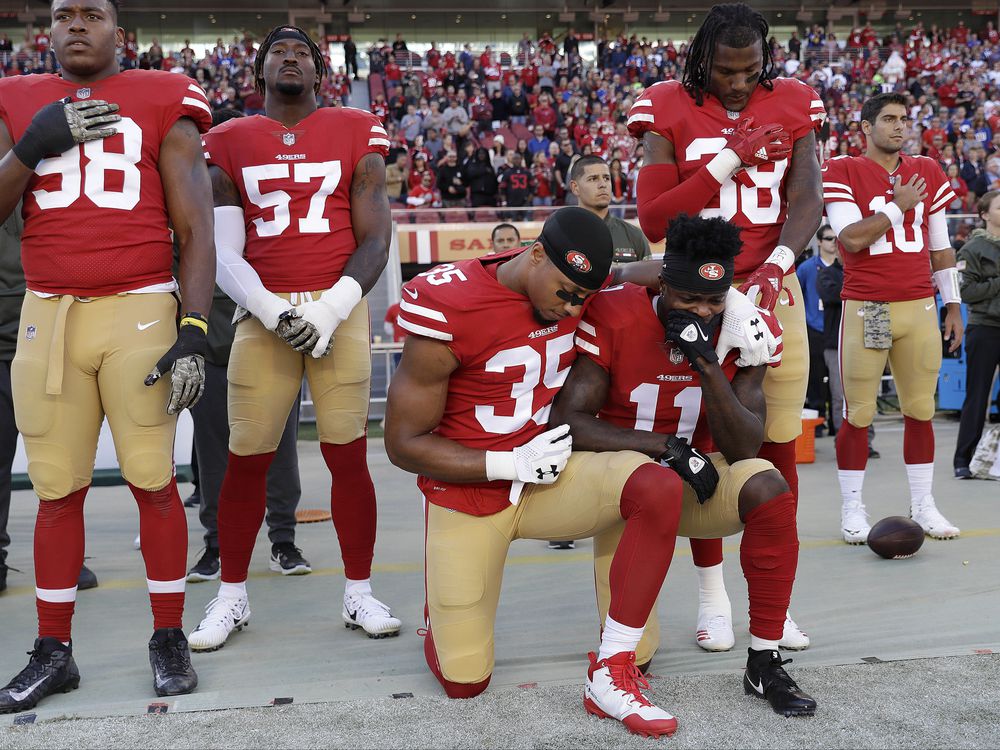Players dismiss NFL’s planned donations to social causes as ploy to stop protests during anthem

Two NFL players who have been kneeling during the national anthem have questioned a tentative plan negotiated this week by the NFL to donate millions of dollars to groups that aid African-American communities, calling it an effort by the league to get them to stop their protests.
The players, Eric Reid of the San Francisco 49ers and Michael Thomas of the Miami Dolphins, said the proposal had been put together without their consent by the NFL and the two leaders of the so-called Players Coalition: Malcolm Jenkins of the Philadelphia Eagles and former wide receiver Anquan Boldin.
In an interview Wednesday night, Reid accused the league of trying to donate money to get the players to end their protests during the national anthem, which have put the league in the crosshairs of U.S. President Donald Trump and fans who have accused the league and players of being unpatriotic.
“It’s apparent the NFL is trying to buy an end to the protests,” Reid said.
Reid and Thomas, who have been kneeling during the anthem to protest social injustice and police brutality, said on Twitter that they had left that coalition, a group of players that has worked to support social justice causes, because Jenkins and Boldin “can no longer speak on our behalf as we don’t believe the coalition’s beliefs are in our best interests as a whole.”
Reid, who last year began kneeling during the anthem with his former teammate Colin Kaepernick, said on Tuesday, “At no point did I say the donations were contingent on me ending my protest.” Reid added that Commissioner Roger Goodell “is trying to buy our silence.”
In a statement, a league spokesman denied that there was any quid pro quo: “The league and owners are working together with players on issues important to all parties to make our communities better.”
Jenkins said in a statement that he could not discuss the proposal specifically because internal discussions were continuing, but said that he was “encouraged” by the league’s “commitment to our cause.”
Jenkins said he was surprised by Reid’s decision to leave the group. But, he added, “whenever you get as many players as we have involved in the coalition, there’s always differences of opinions. But we have made a real effort to make sure that everyone has been included, they’ve been informed and it’s been a pretty transparent process.”
The plan, the details of which were first reported by ESPN, calls for donations of up to US$100 million over seven years from the league, owners and players to organizations like the United Negro College Fund and Dream Corps. According to a draft of the proposal obtained by ESPN, owners would contribute $5 million next year, with their contribution growing to $12 million by 2021. Owners would also contribute up to $250,000, with players matching that amount, to local causes in their team’s region.
If the players accept the plan, the owners would most likely vote on it at their annual meeting in March.
The league also has been considering a change to its national anthem policy. Currently it requires players to be on the sidelines for the anthem but does not explicitly obligate them to stand while it is played. The potential change has led some critics, including Reid, to speculate as to whether the NFL’s proposal to donate money is part of an effort to stop the players from protesting during the anthem.
The league and the members of the Players Coalition, most of whom have been silently protesting during the national anthem since last season, have been talking since August. Their discussions accelerated in the weeks after Trump criticized the league for not penalizing players who did not stand during the anthem.
The players’ group, though, has fractured, raising questions about how many players will approve the NFL’s plan and about whether the agreement will lead to an end to the protests, which have divided the owners and caused concern among the league’s broadcast partners and sponsors. In October, Russell Okung, a lineman for the Los Angeles Chargers and a member of the coalition, took the owners to task for making decisions on anthem demonstrations without broadly consulting the players.
Reid also criticized Jenkins last month for calling a meeting with Goodell and others without consulting with other players in the coalition.
On Tuesday, Reid said Jenkins had been negotiating directly with the league, trying to secure donations in return for players’ agreeing to end their protests. He said that under the plan, a group of five owners, five players and two league officials would decide how to donate the money. Reid said players would lack power in that scenario because the owners and league officials would outnumber the players.
“That is just simple math,” Reid said. “If it came down to a vote, the players would lose every time.”
While hundreds of players protested in the weeks after the president first criticized the players and the league, that number has dwindled to about two dozen players who have continued kneeling or sitting during the national anthem — about as many as were protesting before the president began his series of attacks.
The president, though, has continued to attack the league on Twitter, saying that the league’s declining television ratings and attendance are a result of its unwillingness to force the players to stop their protests.
Reid, though, said that he would continue protesting during the anthem, regardless of whatever deal is struck.





